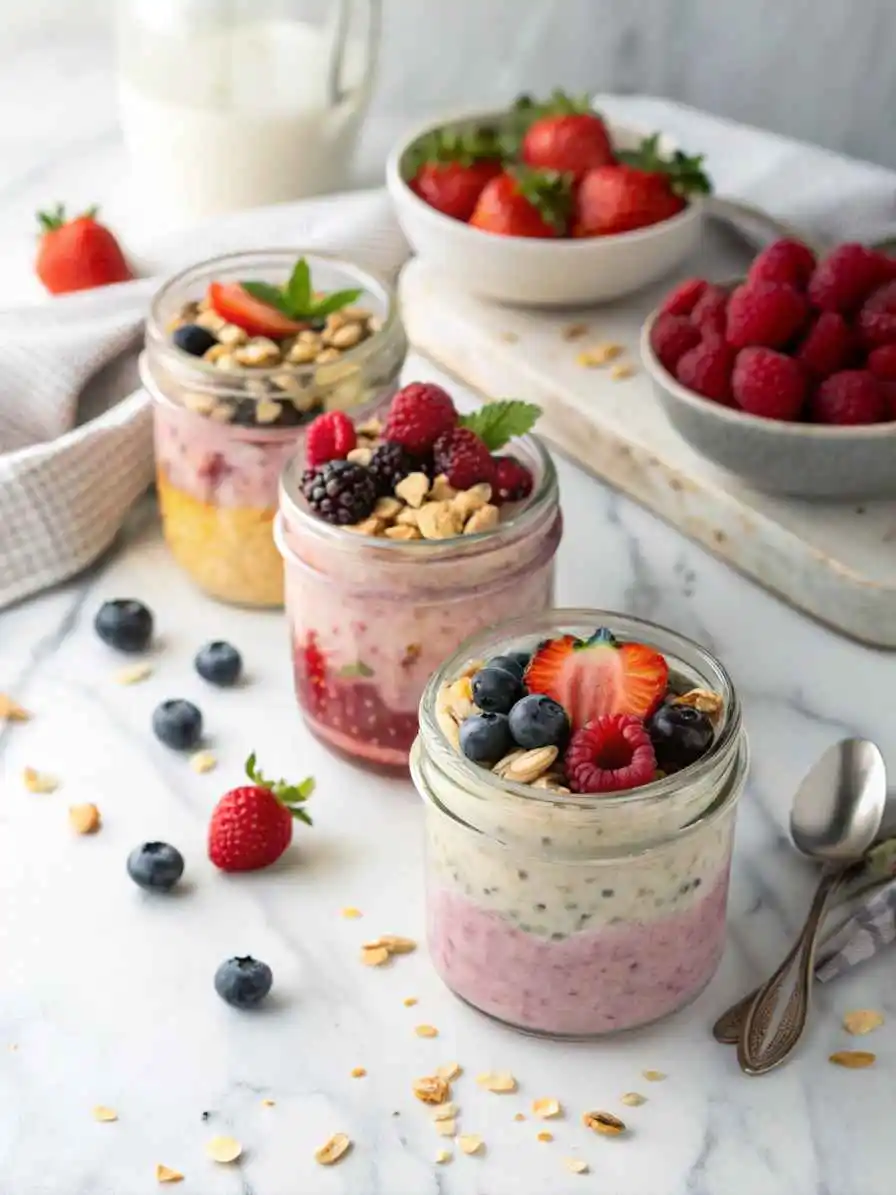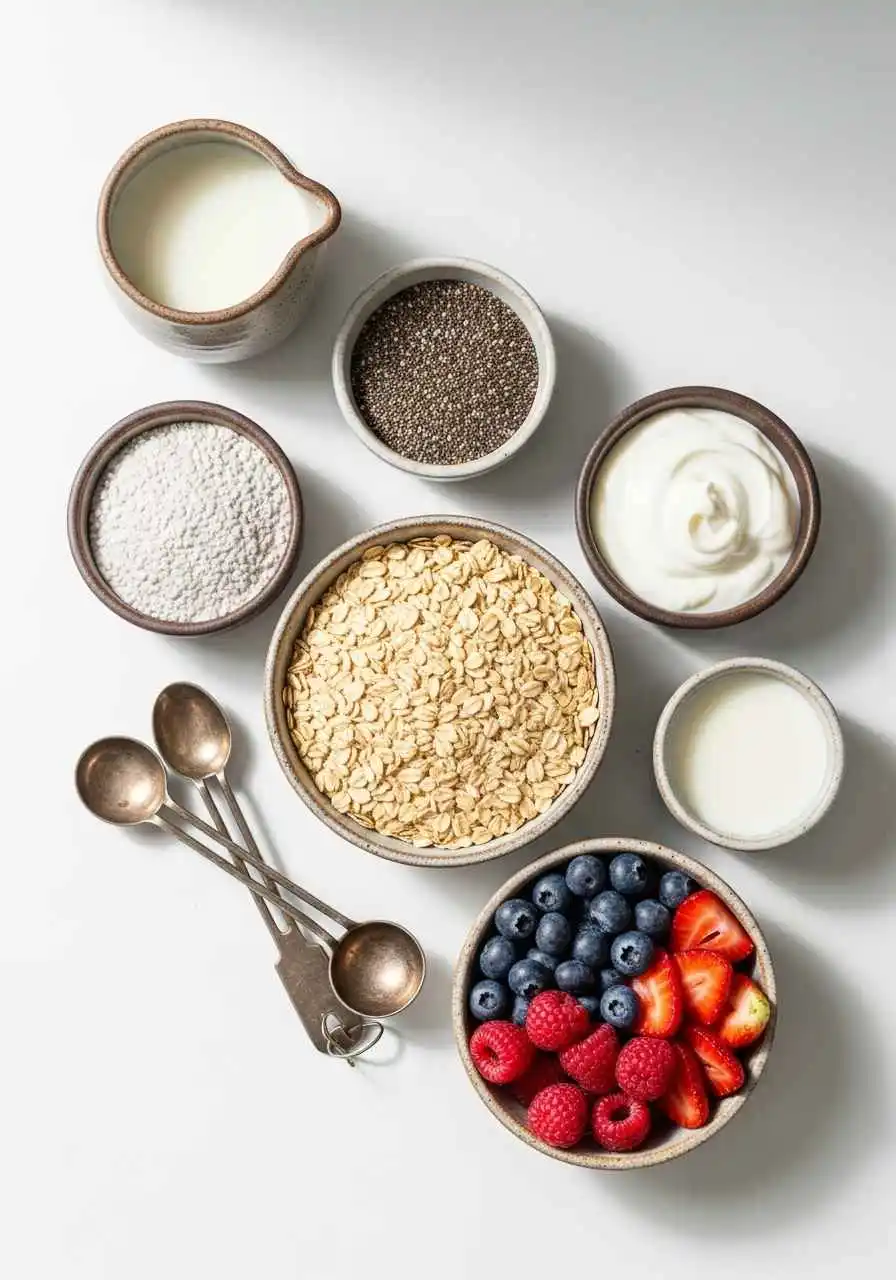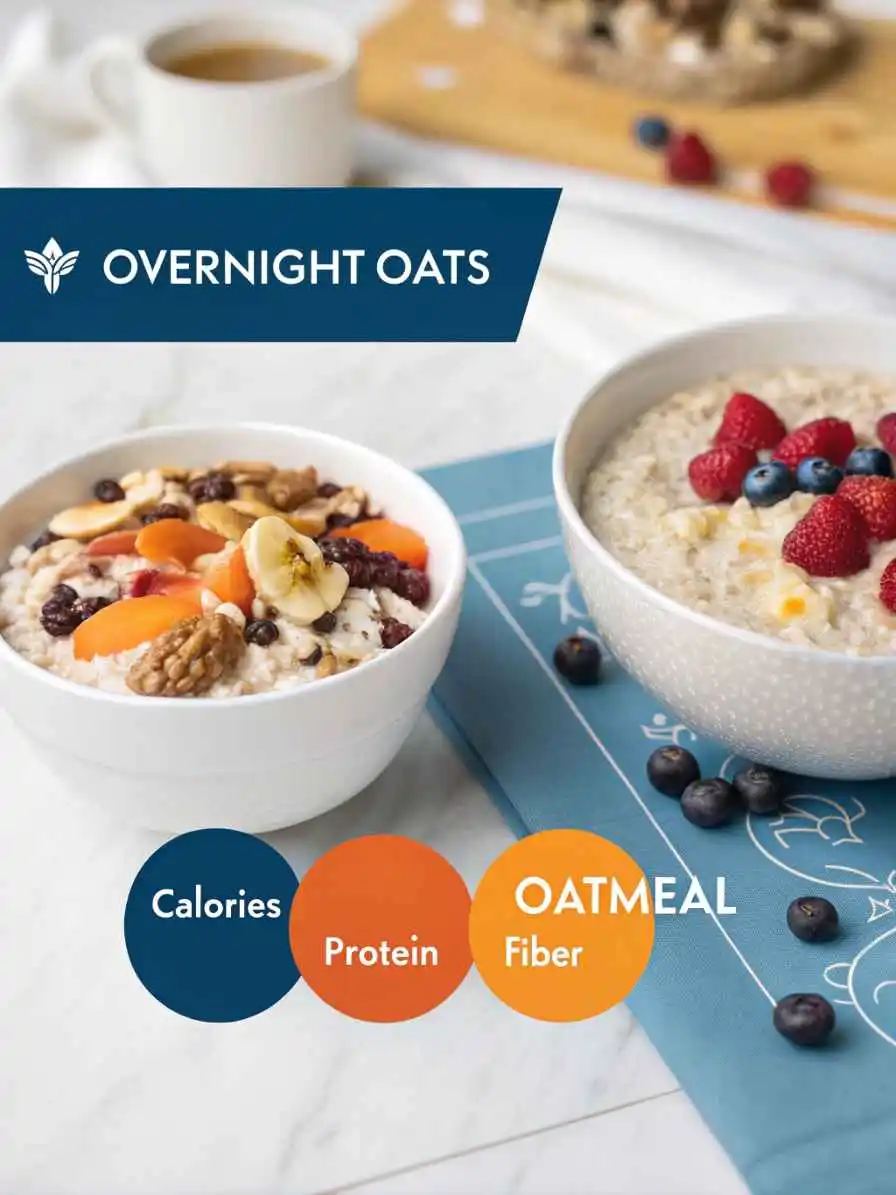Last updated on September 10th, 2025
Are overnight oats healthy choices for your daily breakfast routine? This simple no-cook breakfast has gained tremendous popularity, but many people wonder about its nutritional value and safety. Furthermore, overnight oats offer numerous health benefits while providing convenience for busy mornings. However, their healthiness depends largely on ingredients and preparation methods. Additionally, understanding proper portions and add-ins makes all the difference in creating a nutritious meal that supports your wellness goals.

Learn a bit more abou Overnight Oats Recipe Without Chia Seeds
Table of Contents
Table of Contents
Are Overnight Oats Healthy and Safe for Daily Consumption?
Overnight Oats Health Benefits and Nutritional Value
Overnight oats provide exceptional nutritional value when prepared correctly. Moreover, they contain high amounts of fiber, specifically beta-glucan, which supports heart health and cholesterol management. Additionally, oats naturally provide more protein than most grains, delivering approximately 5 grams per half-cup serving.
The soaking process actually maintains the nutritional integrity of raw oats. Furthermore, studies show that overnight oats preserve their beneficial beta-glucan content, which helps regulate blood sugar levels. Additionally, the fiber content promotes satiety, helping you feel full longer throughout the morning.
| Nutrient | Amount (per 1/2 cup dry oats) | Daily Value % |
|---|---|---|
| Fiber | 4 grams | 14% |
| Protein | 5 grams | 10% |
| Magnesium | 63 mg | 15% |
| Iron | 2.1 mg | 12% |
Safety Considerations and Potential Risks
Generally, overnight oats are safe for daily consumption when properly prepared and stored. Nevertheless, certain considerations apply to specific individuals. Additionally, people with gluten sensitivities should choose certified gluten-free oats to avoid cross-contamination.
Raw oats are generally safe to consume after soaking. However, proper storage remains crucial for food safety. Furthermore, overnight oats should be consumed within 3-5 days when refrigerated in sealed containers. Additionally, signs of spoilage include unusual odors, mold, or changes in texture.
Some individuals may experience digestive discomfort initially. Nevertheless, this typically resolves as the body adjusts to increased fiber intake. Furthermore, gradually increasing portion sizes can minimize potential digestive issues.
Best Overnight Oats for Weight Loss Success
How Overnight Oats Support Weight Management Goals

Overnight oats effectively support weight loss through multiple mechanisms. Moreover, their high fiber content promotes satiety, reducing overall calorie intake throughout the day. Additionally, the protein content helps preserve lean muscle mass during weight loss efforts.
The soluble fiber in oats slows digestion and helps regulate appetite hormones. Furthermore, beta-glucan specifically may increase production of PYY, a hormone that signals fullness. Additionally, studies show that people who eat oatmeal for breakfast consume fewer calories at subsequent meals compared to other breakfast options.
Creating balanced overnight oats requires careful attention to portions and ingredients. Nevertheless, smart choices can keep calories under control while maximizing nutrition. Furthermore, adding protein powder or Greek yogurt increases satiety without excessive calories.
Calorie Content and Portion Control Strategies
A basic overnight oats serving contains approximately 200-300 calories depending on ingredients. However, calories can quickly increase with high-calorie toppings and large portions. Additionally, controlling portion sizes while maintaining satisfaction requires strategic ingredient choices.
The ideal ratio uses half a cup of dry oats with half a cup of liquid. Furthermore, this 1:1 ratio creates proper consistency while controlling calories. Additionally, measuring ingredients prevents accidentally creating calorie-dense portions.
| Ingredient | Serving Size | Calories |
|---|---|---|
| Rolled Oats | 1/2 cup dry | 150 |
| Almond Milk (unsweetened) | 1/2 cup | 20 |
| Greek Yogurt (plain, non-fat) | 1/4 cup | 35 |
| Chia Seeds | 1 tablespoon | 60 |
Overnight Oats Recipe Essentials and Preparation

Basic Overnight Oats Recipe Components
Creating successful overnight oats requires understanding essential components and their functions. Moreover, the foundation includes oats, liquid, and time for proper soaking. Additionally, optional ingredients like yogurt, seeds, and natural sweeteners improve both nutrition and flavor.
Old-fashioned rolled oats work best for overnight preparation. Furthermore, they maintain ideal texture after soaking without becoming mushy. Additionally, avoid quick oats or instant varieties, which become too soft and lose their appealing consistency.
The liquid component significantly impacts both nutrition and flavor. Nevertheless, options include dairy milk, plant-based alternatives, or combinations with yogurt. Furthermore, unsweetened varieties help control added sugars while allowing customization of sweetness levels.
Storage and Meal Prep Guidelines
Proper storage maximizes both safety and quality of prepared overnight oats. Moreover, glass containers with tight-fitting lids work best for storage and portability. Additionally, mason jars provide perfect portion sizes while preventing contamination.
Overnight oats require minimum soaking time of two hours. However, overnight soaking produces optimal texture and flavor development. Furthermore, prepared oats maintain quality for up to five days when properly refrigerated.
Batch preparation saves time while providing consistent healthy breakfasts. Nevertheless, prepare different flavor combinations to prevent boredom. Additionally, prepare dry ingredients in advance, then add liquids the night before consumption for maximum freshness.
Are Overnight Oats Healthy for Diabetics and Blood Sugar
Blood Sugar Impact and Glycemic Index
Overnight oats can be appropriate for people with diabetes when properly prepared. Moreover, the fiber content helps slow carbohydrate absorption, reducing blood sugar spikes. Additionally, research shows that soaked oats maintain their beneficial impact on glucose response compared to cooked varieties.
The glycemic index of oats varies by processing method. Furthermore, rolled oats have a moderate glycemic index around 59, while steel-cut oats rate lower at approximately 53. Additionally, combining oats with protein and healthy fats further reduces the overall glycemic impact of the meal.
Portion control becomes especially important for blood sugar management. Nevertheless, a standard half-cup serving of dry oats provides approximately 30 grams of carbohydrates. Furthermore, this amount can fit into most diabetes meal plans when balanced with protein and monitored carefully.
Diabetic-Friendly Overnight Oats Modifications
Creating diabetes-friendly overnight oats requires strategic ingredient choices. Moreover, reducing oat quantities while adding high-fiber, low-carb ingredients maintains satisfaction. Additionally, incorporating protein sources helps stabilize blood sugar responses throughout the morning.
Substitute regular milk with unsweetened plant-based alternatives to reduce carbohydrate content. Furthermore, add Greek yogurt for protein without excessive carbs. Additionally, include nuts, seeds, and small amounts of berries for flavor and nutrients without significant blood sugar impact.
Natural sweeteners require careful consideration for blood sugar control. Nevertheless, small amounts of stevia or monk fruit provide sweetness without carbohydrates. Furthermore, cinnamon adds flavor while potentially providing modest blood sugar benefits.
Nutritional Benefits and Fiber Content Analysis
Fiber, Protein, and Essential Nutrients Breakdown
The exceptional fiber content makes overnight oats particularly beneficial for digestive health. Moreover, beta-glucan fiber specifically supports heart health by helping reduce cholesterol levels. Additionally, this soluble fiber feeds beneficial gut bacteria, promoting overall digestive wellness.
Protein content in oats exceeds most other grain options. Furthermore, combining oats with additional protein sources creates complete amino acid profiles. Additionally, this protein content supports muscle maintenance and provides sustained energy throughout the morning.
Essential minerals in oats include magnesium, iron, and zinc. Moreover, these minerals support immune function, energy metabolism, and bone health. Additionally, B-vitamins in oats contribute to nervous system function and energy production.
Heart Health and Digestive Benefits
Regular consumption of oats provides significant cardiovascular benefits. Furthermore, beta-glucan fiber specifically helps reduce both total and LDL cholesterol levels. Additionally, studies show that consuming at least 3 grams of beta-glucan daily can lower cholesterol by 5-10%.
The prebiotic properties of oat fiber support beneficial gut bacteria growth. Moreover, this contributes to improved digestive health and immune function. Additionally, the high fiber content promotes regular bowel movements and prevents constipation.
Anti-inflammatory compounds in oats may provide additional health benefits. Furthermore, avenanthramides, unique antioxidants found in oats, have anti-inflammatory and anti-itching properties. Additionally, these compounds may help protect against heart disease and other inflammatory conditions.
Healthy Toppings and Ingredient Combinations
Best Protein Additions and Mix-ins
Strategic protein additions transform basic overnight oats into complete, balanced meals. Moreover, Greek yogurt provides probiotics along with high-quality protein. Additionally, protein powder offers convenient protein boosts without significantly changing texture or flavor.
Nuts and seeds contribute both protein and healthy fats. Furthermore, almonds, walnuts, and pecans provide satisfying crunch and important nutrients. Additionally, chia seeds and ground flaxseed offer omega-3 fatty acids along with additional fiber and protein.
Nut butters create creamy, satisfying textures while boosting protein content. Nevertheless, portion control remains important due to their caloric density. Furthermore, natural varieties without added sugars or oils provide the best nutritional value.
What to Avoid in Overnight Oats
Certain ingredients can transform healthy overnight oats into high-calorie, high-sugar meals. Moreover, excessive dried fruits, sweetened yogurts, and flavored milks add unnecessary sugars and calories. Additionally, large amounts of nuts and nut butters quickly increase caloric content beyond reasonable portions.
Artificial sweeteners may seem appealing for calorie control. However, some individuals experience digestive discomfort from these additives. Furthermore, natural sweetness from fresh fruits often provides better flavor and additional nutrients.
Pre-packaged flavored oat products often contain added sugars, artificial flavors, and preservatives. Nevertheless, homemade versions allow complete control over ingredients and nutrition content. Additionally, reading labels carefully helps identify hidden sugars and unnecessary additives.
Common Overnight Oats Mistakes and Solutions
Why Some Overnight Oats Are High in Calories
Calorie content can escalate quickly with portion size miscalculations and high-calorie additions. Moreover, using too much liquid-to-oat ratio creates large portions without increased satisfaction. Additionally, generous amounts of nuts, nut butters, and dried fruits significantly increase caloric density.
Sweetened milk alternatives and flavored yogurts add hidden calories and sugars. Furthermore, these ingredients often contain more calories than expected. Additionally, measuring ingredients rather than estimating helps maintain appropriate portion sizes and calorie control.
Multiple high-calorie toppings compound the caloric impact. Nevertheless, choosing one or two nutrient-dense additions provides flavor and nutrition without excessive calories. Furthermore, focusing on volume through low-calorie additions like berries creates satisfying portions with controlled calories.
Texture and Consistency Problem Solving
Common texture problems have straightforward solutions with ingredient adjustments. Moreover, overly thick overnight oats result from insufficient liquid or too much thickening agents. Additionally, thin, watery consistency indicates too much liquid or inadequate thickening ingredients.
Chia seeds provide excellent thickening properties when used correctly. Furthermore, allowing adequate soaking time enables proper expansion and gel formation. Additionally, starting with smaller amounts and adjusting based on preference prevents over-thickening.
Using inappropriate oat varieties creates texture problems. Nevertheless, rolled oats provide the ideal balance of softness and structure after soaking. Furthermore, avoiding quick oats prevents mushy, unappetizing consistency that many people find objectionable.
Overnight Oats vs Traditional Oatmeal Comparison

Nutritional Differences and Benefits
Both overnight oats and cooked oatmeal provide similar nutritional foundations. However, preparation methods create subtle differences in nutrient availability and digestibility. Additionally, overnight oats retain higher levels of resistant starch, which provides prebiotic benefits for gut health.
The cooking process breaks down some fiber structures in traditional oatmeal. Furthermore, this makes nutrients more readily available but may reduce some prebiotic benefits. Additionally, overnight oats maintain more intact fiber structures that support beneficial bacteria growth.
Temperature preferences and digestive responses vary among individuals. Nevertheless, both preparation methods provide excellent nutrition when made with quality ingredients. Furthermore, choosing between them often depends on personal preference, time constraints, and seasonal considerations.
Which Option Is Better for Your Goals
Weight management goals may favor overnight oats due to their convenience factor. Moreover, pre-prepared portions help control serving sizes and prevent impulsive breakfast choices. Additionally, the cold preparation method makes them portable and convenient for busy schedules.
Digestive sensitivity may influence the better choice for some individuals. Furthermore, cooked oats may be easier to digest for people with sensitive digestive systems. Additionally, the warming properties of hot oatmeal appeal to many people, especially during colder months.
Meal prep habits usually shape which option works best. Overnight oats shine for their make-ahead ease and grab-and-go portability, while classic oatmeal offers instant coziness and a freshly cooked, comforting start when you have the time to prepare it.
Craving more kitchen moments and fresh recipe inspo?
Join me on Facebook and Pinterest I can’t wait to check out what you’re whipping up!
Frequently Asked Questions
Are overnight oats healthy for weight loss?
Yes, overnight oats support weight loss when prepared with appropriate portions and healthy ingredients. The high fiber content promotes satiety, helping reduce overall calorie intake throughout the day. Additionally, protein additions help maintain muscle mass during weight loss efforts while providing sustained energy.
Is it okay to eat overnight oats every day?
Eating overnight oats daily is generally safe and beneficial for most people. However, varying ingredients and flavors prevents nutritional monotony and maintains interest. Furthermore, individuals with specific digestive sensitivities should monitor their response and adjust frequency accordingly.
What not to add in overnight oats?
Avoid excessive dried fruits, sweetened yogurts, flavored milk alternatives, and large amounts of nuts or nut butters, as these significantly increase calories and sugars. Additionally, artificial sweeteners may cause digestive discomfort for sensitive individuals. Furthermore, pre-packaged flavored oat products often contain unnecessary additives and preservatives.
Why are overnight oats so high in calories?
Overnight oats become high in calories through portion size miscalculations and calorie-dense additions. Multiple high-calorie toppings like nuts, nut butters, dried fruits, and sweetened ingredients quickly accumulate calories. Additionally, using large amounts of oats or liquid creates oversized portions that exceed appropriate calorie ranges for most people.
Conclusion
Are overnight oats healthy? Absolutely, when prepared thoughtfully with quality ingredients and appropriate portions. These convenient breakfast options provide excellent nutrition through high fiber content, quality protein, and essential nutrients that support overall health. Moreover, their versatility allows customization for various dietary needs and preferences while maintaining nutritional integrity.
The key to healthy overnight oats lies in ingredient selection and portion control. Furthermore, focusing on whole food additions like fresh fruits, nuts, and seeds maximizes nutrition while minimizing processed ingredients. Additionally, understanding proper ratios and preparation methods creates consistently satisfying and nutritious meals that support your health goals effectively.
Whether your goal involves weight management, blood sugar control, or simply convenient healthy eating, overnight oats can fit into most wellness plans successfully. Nevertheless, individual responses vary, so pay attention to how your body responds and adjust ingredients accordingly. Furthermore, consulting healthcare providers helps ensure overnight oats align with specific health conditions and dietary requirements for optimal results.
